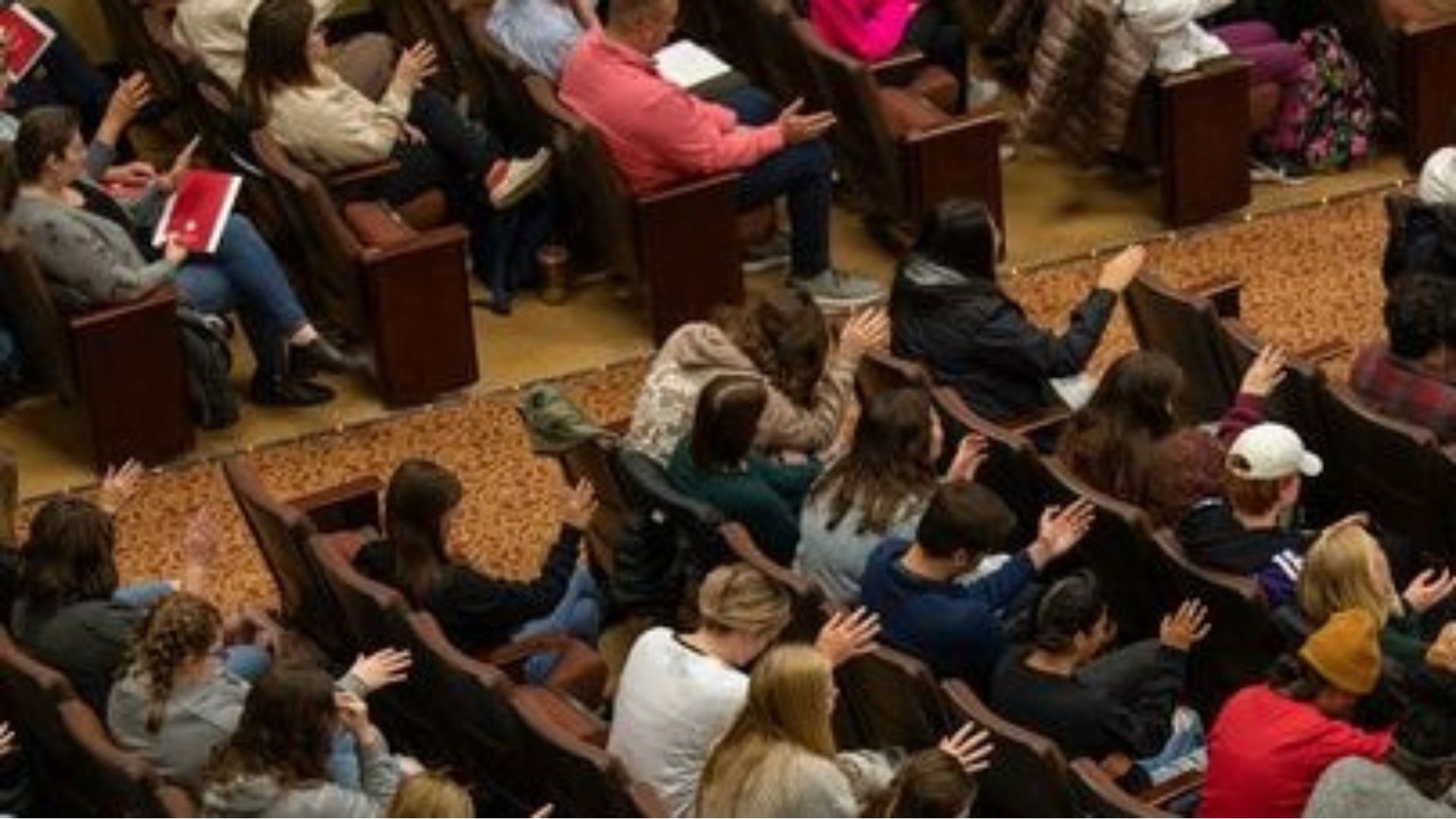If God brought new life, how would you know? God’s work at Asbury University gives Wesleyans reason for celebration — and a fresh opportunity to re-examine what we mean by “revival.”
On February 8, 2023, a normal Wednesday chapel service at Asbury catalyzed a 16-day outpouring of repentance, worship and prayerful attentiveness to God’s presence.
“As I walked into Asbury with about 17 students, the first thing I saw was the words above the altar: ‘Holiness unto the Lord,’ it said. And below, the altar completely full of people young and old; people in their 60s and 70s, and 18-to-20-year-olds — praying together, some praying separately, on their knees. Below those words: ‘Holiness unto the Lord’ were a slew of people moved to repent,” said Brandon Charlton, coordinator of Strategic Partnerships and Gospel Choir director at Indiana Wesleyan University (IWU).
Rather than being driven by platform or spectacle, the movement at Asbury has been sparked by God’s quiet work among the community in Wilmore, Kentucky. Even those who were skeptical were stirred by their experience there.
One attender reflected on his time at Asbury, saying, “I have no interest in hype culture. Sometimes Christians try to capitalize on the gifts of charismatic leaders and make it about platforms. I don’t want that: I long for the genuine thing, the real thing. If you were to be at Asbury and experience what is happening, it is a meek experience — it did not feel like a mountaintop experience. It felt like a really steady thing. That’s the atmosphere; it’s a really steady, nameless and faceless experience … no one is trying to take platform, nobody is trying to elevate themselves.”
People from around the country and the world have made their way to Asbury to experience the movement of God; people are finding faith in Christ, accepting calls to vocational ministry; relationships are being restored. Wesleyan campuses and congregations have (at times) sensed God stirring similar things in their midst.
“I was there with about 25 students on days four and five of the outpouring. My experience was incredibly similar to the hundreds of accounts that have poured out from Asbury. It should not surprise us that people from different theological traditions and faith streams have articulated a noticeably similar account of worship characterized by peace, love and humble leadership,” said Rev. Dr. Andrea Summers, campus pastor and dean of Spiritual Formation at IWU. “I find it so kind of God to meet GenZ at their points of greatest need. He provided palpable peace for a generation wracked by anxiety. He poured overwhelming love over a generation crushed by loneliness. He supplied decentralized leadership for a generation hurt by the abuse of power.”
Even as our denomination joins together in celebrating this movement of God, it seems likely that many in our congregations who are aware of Asbury are wondering: “How do we make sense of the fact that God is not moving the same way in every church?”
The answer might be because God is moving in other ways there already.
“Perhaps it does not look like the bonfire that has lit up the town of Wilmore,” said Dr. Summers. “But there is a slow and steady burn that is growing in intensity here at Indiana Wesleyan as God continues to move in hearts and lives.”
Our pan-Wesleyan heritage is firmly planted in the conviction that God can bring new life. But our tradition is equally adamant that God’s method for bringing new life can be different in each time and place: in some circumstances, that new life may be obvious — when the presence of God is tangible, and repentance seems like the only right response. In other circumstances, new life is difficult, demanding and slow.
 What if revival looks like a powerful intergenerational movement of God on a college campus?
What if revival looks like a powerful intergenerational movement of God on a college campus?
What if revival looks like years of quietly turning away from anger, toward love and reconciliation?
Both are expressions of revival; to overlook either — as many of us are tempted to — is not a failure of God to work: it’s a failure of our ability to imagine where holiness may be hiding.
For those of us who are celebrating the Spirit’s outpouring and missing the slow work in our own congregations, and for those who are suspicious of revival and missing the genuine work of God at Asbury, the lesson may be the same: what matters in revival for Wesleyans is not whether people feel stirred into feeling something; what matters is that people begin a journey toward becoming something — a person who takes on the character of Jesus Christ.
In the words of Wesleyan theologian, Rev. Dr. John Drury, “We pray for fresh fire, even as we ask God for daily bread.”
Asbury seems to be experiencing fresh fire: an outpouring of the Holy Spirit that leads to real change for those involved — not just in enthusiasm or spectacle or platforming — but in people who live out the way of Jesus: loving, serving, confessing and reconciling. As Brandon Charlton reflected, “There was a gentle but weighty love of God present.” 
In our celebrations of that movement, we can also be thankful for the quiet ways God is providing our congregations daily bread — nourishing the small miracles of new life that (year over year) continue to happen as people take on the habits, dispositions and character of Christ.
Rev. Ethan Linder is the pastor of discipleship at College Wesleyan Church in Marion, Indiana, and contributing editor at The Wesleyan Church’s Education and Clergy Development Division.

